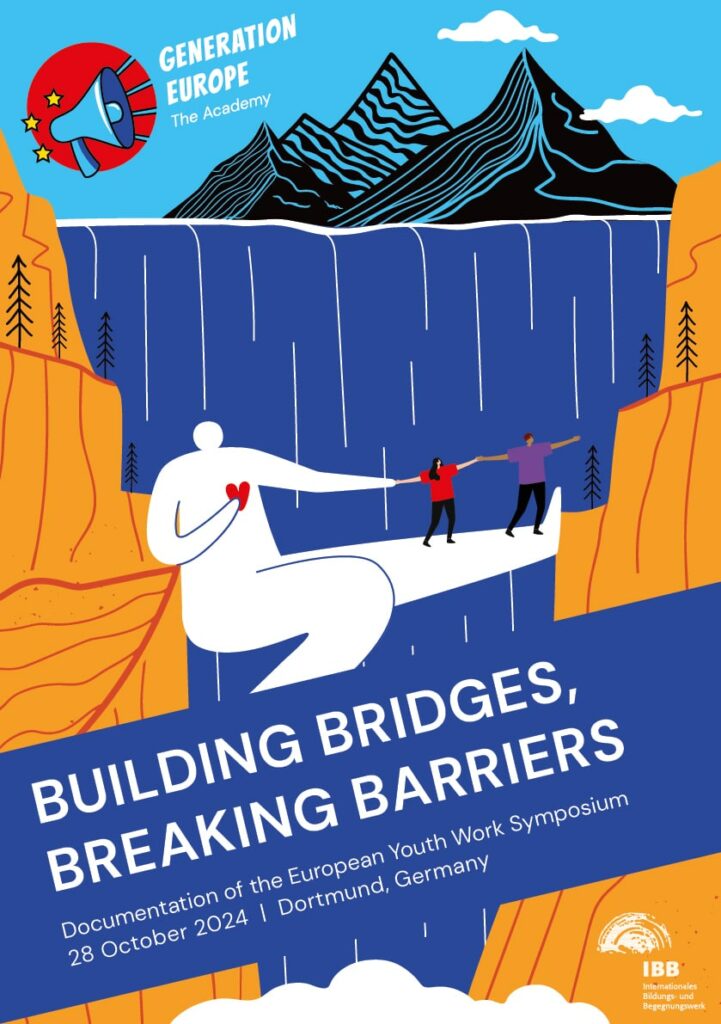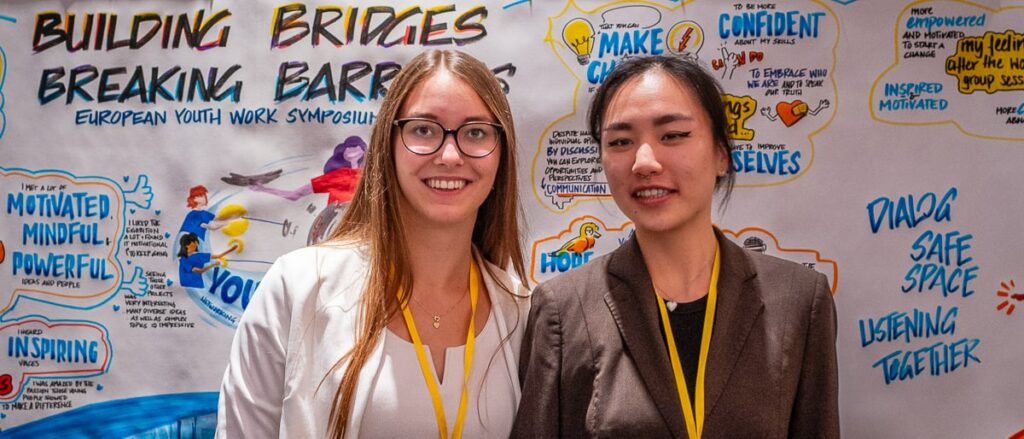A comprehensive documentation of the results of the European Youth Work Symposium in Dortmund, Germany has now been published! Here is the executive summary written by Gisele Evrard:
The European Youth Work Symposium ‚Building Bridges – Breaking Barriers‘ brought together youth workers, young people, policymakers, researchers, and funding representatives from across Europe. Organised by the International Association for Education and Exchange (IBB e.V.) in the framework of Generation Europe – The Academy, the event provided a platform to address critical challenges in youth work.

Building Bridges, Breaking Barriers
Documentation of the European Youth Work Symposium, 28 October 2024 in Dortmund, Germany
Published by IBB e.V.
64 pages, 1st edition 2025
pdf Download| 5,4 MB
Participants shared good practices and advocated for sustained support to ensure that youth work continues its essential role in promoting democracy and inclusion. Keynotes and expert inputs reinforced the importance of youth work as a cornerstone for civil society and underscored the urgent need for sustainable resources and recognition. Unlike many other stakeholder conferences, one important goal of the symposium was to enable young people, who are the target group of youth work, to take part in the policy debates on an equal footing. Therefore, a special training and preparation day, known as the ‘Youth Day’, was organised for the young participants involved in the Generation Europe partnerships. During that day, they prepared their statements on the topics of the symposium, finalised an exhibition of their best practice examples, familiarised themselves with the situation of public speaking and tried out their skills.

Main messages from the opening and keynote addresses
In her opening speech, Jocelyne Jakob, Managing Director of IBB e.V., highlighted how youth work operates in a fragile financial state and faces a lack of recognition. She insisted on how local youth initiatives bring essential transformative change and how youth work contributes to equipping young people to engage in democratic processes. She called for lasting funding mechanisms to ensure that youth work is sustainable and quoted Oskar Negt‘s statement about Democracy being the only form of government that needs to be learnt, shedding light on the urgent need for structural and institutional support for youth work in order to defend democracy.
The keynote address of Katia Henrikh, youth worker and project coordinator of the the Ukrainian association Duga, walked the audience through an inspirational story which illustrated both youth work‘s transformative power and young people‘s potentials. Sharing personal experiences of her journey from participating in her first international youth project as a youngster to becoming a professional in the field, she illustrated current social issues affecting youth work such as inequality, authoritarianism, and burnout. She called for collective action to protect and support youth workers and the young people involved. Her message was clear: youth work is essential for fostering resilience, solidarity, and hope, but it requires systemic change to succeed.
In her interview, Marit Pelzer, researcher at the Centre for European Youth Policy at the German Youth Institute (DJI), presented her research’s main insights about the systemic challenges that youth work face nowadays. She underlined the disconnection and, to a certain extent, inadequacy between the high expectations placed on youth workers and the still insufficient resources they and their structures receive. Connected to that, she called for paying attention to the two predominant perspectives in youth (work) policy: young people are seen on the one hand as valuable resources for society and as vulnerable individuals in a phase of development on the other. These contrasting views influence how policies are shaped and implemented. Marit Pelzer stressed the need for mutual understanding between youth workers and decision-makers, advocating for sustainable funding, accountability, and professional recognition. She also emphasised the importance of youth mainstreaming across all sectors, rather than limiting youth voices to youth-specific initiatives, calling the Symposium’s participants to work together to advocate for policies that see and value youth work as a fundamental pillar of democratic societies.
Outcomes of the working groups
The Symposium made space for in-depth discussions across five thematic working groups, supported by expert inputs and providing an arena for youth-driven perspectives that led to possible recommendations and actionable steps.
1. Stronger Together: Organising Youth Workers and Their Allies
The working group addressed the challenges faced by youth workers, including a lack of recognition, inadequate funding, and difficult working conditions. Discussions highlighted the need for stronger advocacy networks, standardised methods to measure the impact of youth work, and greater professionalisation of and within the field. Participants also underlined issues such as a predominantly female workforce, intensified by maternity leaves, high levels of stress, limited mental health support, and low pay, which drive youth work professionals out of the sector. Recommendations focused on fostering cross-sectoral cooperation and building sustainable alliances with policymakers to increase collective voices, secure recognition for youth work, and strengthen its role in supporting young people.
2. Mind Matters: Promoting Young People’s Well-Being in Youth Work
Mental health emerged as a priority, with participants highlighting the need for safe spaces in schools, youth centres, and public places, as well as spaces incorporated into existing programmes to build trust, reduce stigma, and empower young people to express themselves without fear of judgment. Emotional education should focus on mental health awareness, relationships, and the impact of social media, while practical training for youth workers and educators must address emotional first aid and resilience-building. Sustained advocacy was highlighted as essential to securing resources and recognition for mental health initiatives benefiting both young people and youth workers.
3. Overcoming Barriers: Fostering More Inclusive, Accessible Youth Work
Inclusion and accessibility were core elements of the working group, exploring the structural and cultural barriers that limit youth work opportunities for certain groups and thereby exclude them. Cultural diversity was recognised as a strength, with participants advocating for inclusive settings that celebrate differences and foster intercultural dialogue through methods like non-verbal com-munication, which effectively build solidarity and understanding. Recommendations emphasised adopting an intersectional approach to adapt youth work to diverse cultural, social, and economic contexts, moving away from a ‘one-size-fits-all’ model. Additional proposals included developing guidelines for inclusive practices, launching campaigns to celebrate diversity, and securing long-term funding to support inclusive youth work initiatives.
4. Level Up: Strengthening Local Youth Work for European Cooperation
The working group emphasised the importance of international cooperation and strong local youth work as a basis for lasting and meaningful change, fostering a continuous engagement cycle. To address challenges like sustaining youth involvement, participants highlighted the need for organisations to adapt their structures to better appeal to younger generations. Practical solutions included increasing the availability of youth centres and leveraging social media to maintain engagement. Inclusion was another key focus, with a discussion on how new technical developments may be used to increase the accessibility of youth work. Intergenerational challenges were also discussed, with differing opinions on whether young people or older generations struggle more to listen. The exchanges also tackled whether organisations should prioritise adapting local structures to better serve young people or collaborate with similar groups across regions. Since both approaches seemed feasible and can also be combined, the discussions reflected the rich diversity of perspectives on strengthening youth work.
5. Active Citizenship and Youth Activism: Two Sides of the Same Coin
Civic education, combining theory with practical experiences, was highlighted as essential for promoting active citizenship. It was discussed how platforms like Generation Europe – The Academy play a vital role by providing spaces for young people to exchange ideas, collaborate, and take meaningful action. Safe spaces were also seen as important for promoting openness, a sense of belonging, and empowerment. Participants recommended reforming education systems to include practical experiences and stressed the importance of sustained dialogue between young people and policymakers. Such dialogue would address misunderstandings and ensure institutional support for youth activism. Additionally, they called for more opportunities for young people to take on responsibilities, particularly in decision-making within political and institutional settings.
Calls for Action
The Symposium called for prioritising youth work as a critical driver of democratic and inclusive societies. The key priorities identified included:
- Recognising youth work as a profession and providing adequate education and training to equip youth workers to meet emerging challenges.
- Embedding mental health, inclusion, and active citizenship into youth work initiatives, programmes, and funding mechanisms.
- Lowering barriers of participation through tailored initiatives that reflect the needs of young people with diverse backgrounds.
- Strengthening networks and fostering collaboration at local, national, and European levels as part of an integrative model that recognises the need to consolidate local institutions, groups and initiatives to enable sustainable international cooperation.
- Securing sustainable, long-term funding to support youth work structures, as youth work is currently at its limit in many ways, and there is a risk that existing structures will collapse or no longer be able to fulfil their growing tasks if there is no change.
In a nutshell, the Symposium underlined that youth work is one of the keys to democracy and social cohesion. Thanks to quality exchanges, presentations, and reflections, participants reinforced their commitment to addressing challenges, increasing the voices of young people, and ensuring that youth work continues to inspire and empower the next generations. However, more financial security and a more stable environment are urgently needed for this.
Download the Executive Summary as a pdf file (718 kb).
